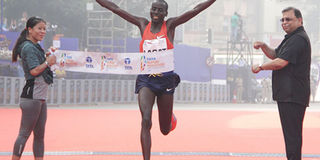Kenya's Cosmas Lagat wins Mumbai Marathon

Kenya's Comsas Lagat crosses the finishing line to win the 2019 Tata Mumbai Marathon on January 20, 2019. PHOTO | IAAF |
What you need to know:
- Lagat crossed the line in 2:09:15 for his third win over the classic distance in six outings, his other two victories also coming in hot weather conditions in the Spanish city of Seville. Bantie finished second in 2:10:05 and Akalnew third in 2:10:14.
- “I thought Lagat might come back to us in the last kilometres because he had changed his pace so quickly and he ran so fast (between 29 and 35 kilometres),” said Bantie. “But after 35km I knew I was running for second place.”
Kenya’s Cosmas Lagat and Ethiopia’s Worknesh Alemu upset the formbook and produced outstanding performances in hot conditions to triumph at the Tata Mumbai Marathon on Sunday, winning at the IAAF Gold Label road race in 2:09:15 and 2:25:45 respectively.
Both marks were the second fastest winning times in the history of the event, the pair taking first prize cheques of USD $45,000 (Sh4.5million).
With temperatures higher than expected and reaching 23C when the gun went, the leading women started with a flourish and the sizable leading pack with their male pacemakers went through 10 kilometres in 34:28 and 20 kilometres in 1:08:42.
The men’s race naturally started steadily and a large pack of 14 runners – including three pacemakers – went through 10 kilometres in 30:53, 20 kilometres in 1:02:18 and the halfway point in 1:05:15.
However, Lagat made a decisive surge just before 29 kilometres and quickly put daylight between himself and his rivals, partially splitting up the leading pack.
Lagat passed 30 kilometres in 1:32:34, assisted by two pacemakers whom he kept instructing to go faster, with a chasing pack of seven men 11 seconds behind.
The remaining pacemakers were to drop out at about 32 kilometres but Lagat bravely pressed on and kept on increasing the gap, to almost 40 seconds by 35 kilometres, although later he admitted that despite feeling strong, he spent much of the final 10 kilometres running scared.
“It was a good moment to make a break, but I also knew there were good runners behind me,” he said. “From 35km I was never sure how close there were to me or whether they were coming back to me.”
In fact, at 38 kilometres he had almost a minute’s lead before Ethiopia’s Aychew Bantie edged away from his compatriot Shumet Akalnew in the closing kilometres to clinch second and reduce the winning margin to 50 seconds by the finish.
Lagat crossed the line in 2:09:15 for his third win over the classic distance in six outings, his other two victories also coming in hot weather conditions in the Spanish city of Seville. Bantie finished second in 2:10:05 and Akalnew third in 2:10:14.
“I thought Lagat might come back to us in the last kilometres because he had changed his pace so quickly and he ran so fast (between 29 and 35 kilometres),” said Bantie. “But after 35km I knew I was running for second place.”
Pre-race favourite Abera Kuma, the fastest man in the field with a best of 2:05:50, drifted away from the leading pack just after 30 kilometres and from that point was never in contention for a place on the podium, eventually finishing seventh in 2:13:10.
Four women – Alemu and her Ethiopian compatriots: pe-race favourite Amane Gobena, Birke Debele and Mergetu Alemu – were still in contention at 30 kilometres which was passed in 1:43:14, still giving hope that the course record of 2:24:33 set by Kenya’s Valentine Kipketer in 2013 could be challenged.
Mergetu Alemu soon dropped off the pace and a couple of kilometres down the road so too did Debele, but Gobena doggedly held on for two kilometres more until Worknesh Alemu made a second and decisive surge just before 35 kilometres.
Alemu shook off Gobena but given the credentials of her rival and the intensity of the conditions, with temperatures by now having risen to 26C, nothing was certain.
But Alemu maintained her focus to clock an impressive personal best of 2:25:45 and finish 24 seconds ahead of the defending champion, who finished second in 2:26:09, despite suffering from stomach problems over the final 10 kilometres.
Debele hung on for third in 2:26:39 as Ethiopian runners filled the first seven slots.
India’s Sudha Singh finished eighth in 2:34:56, an Indian best in Mumbai, a personal best and the second fastest time by an Indian woman ever, just 13 seconds away from the national record.
As magnificent as Singh’s performance was by local standards – and she booked her place on the team going to the IAAF World Athletics Championships Doha 2019 in September – she might be left to rue her cautious first half, running more than seven minutes behind the leading pack, before uncorking a huge negative split by almost six minutes from the halfway point onwards.




